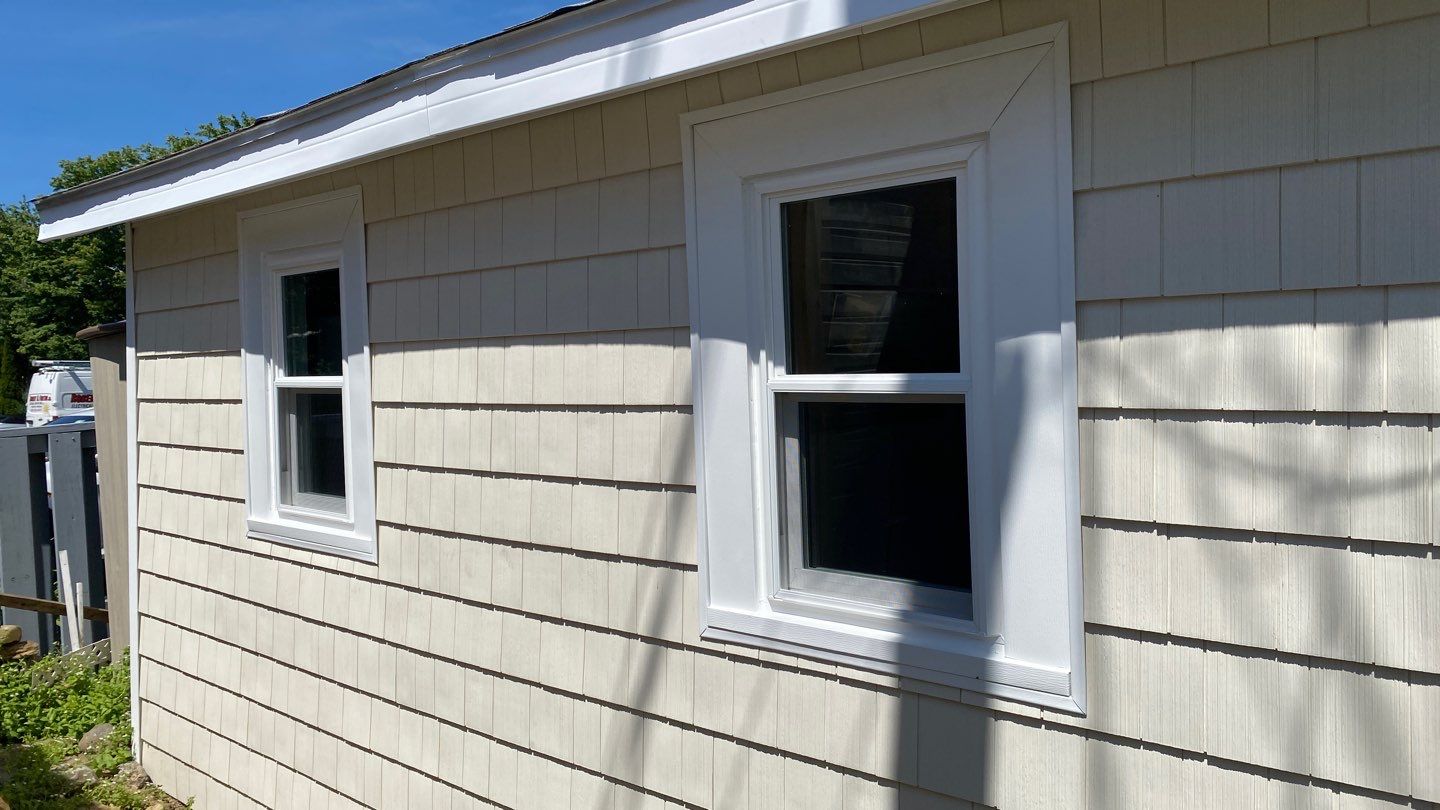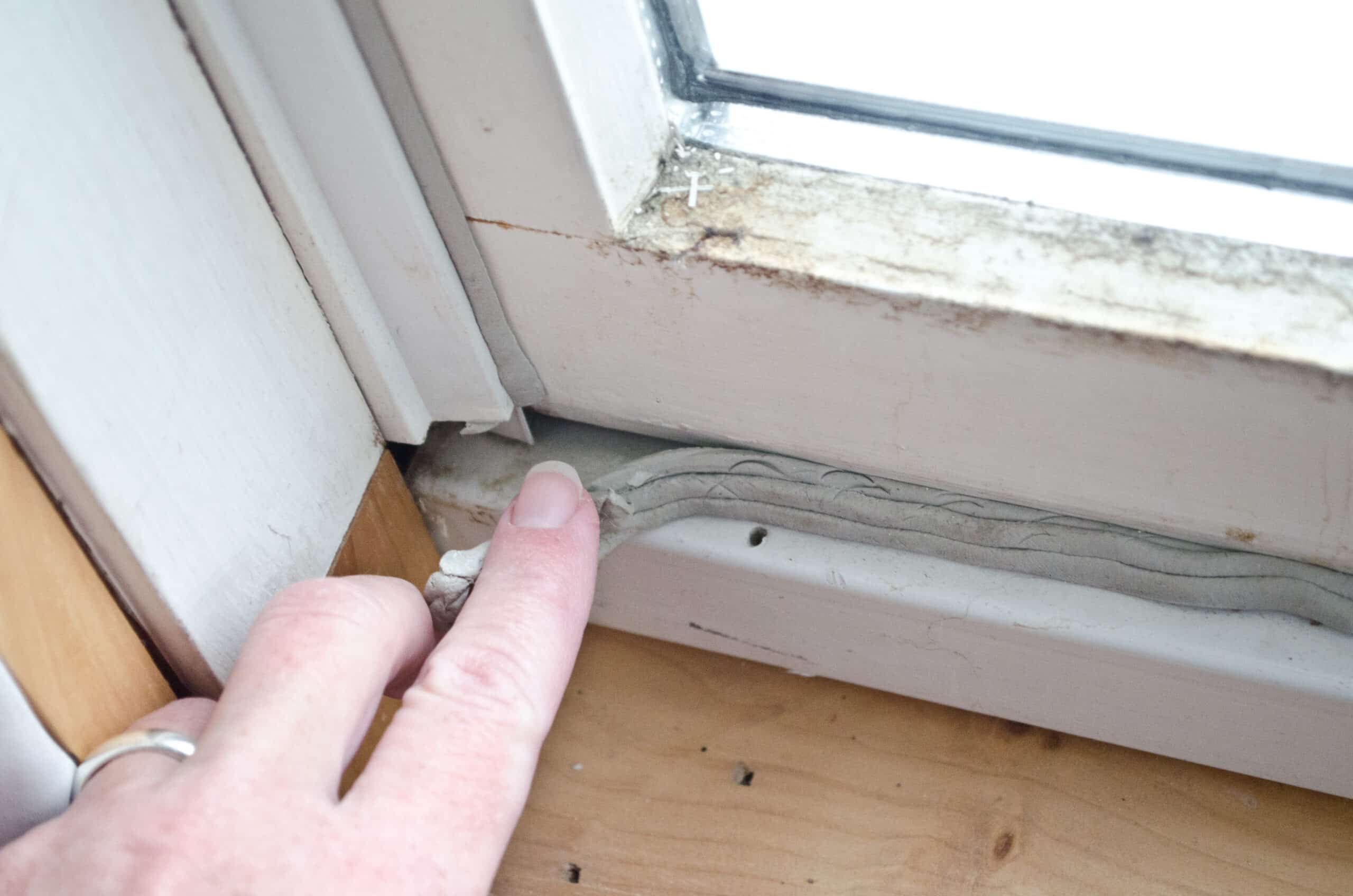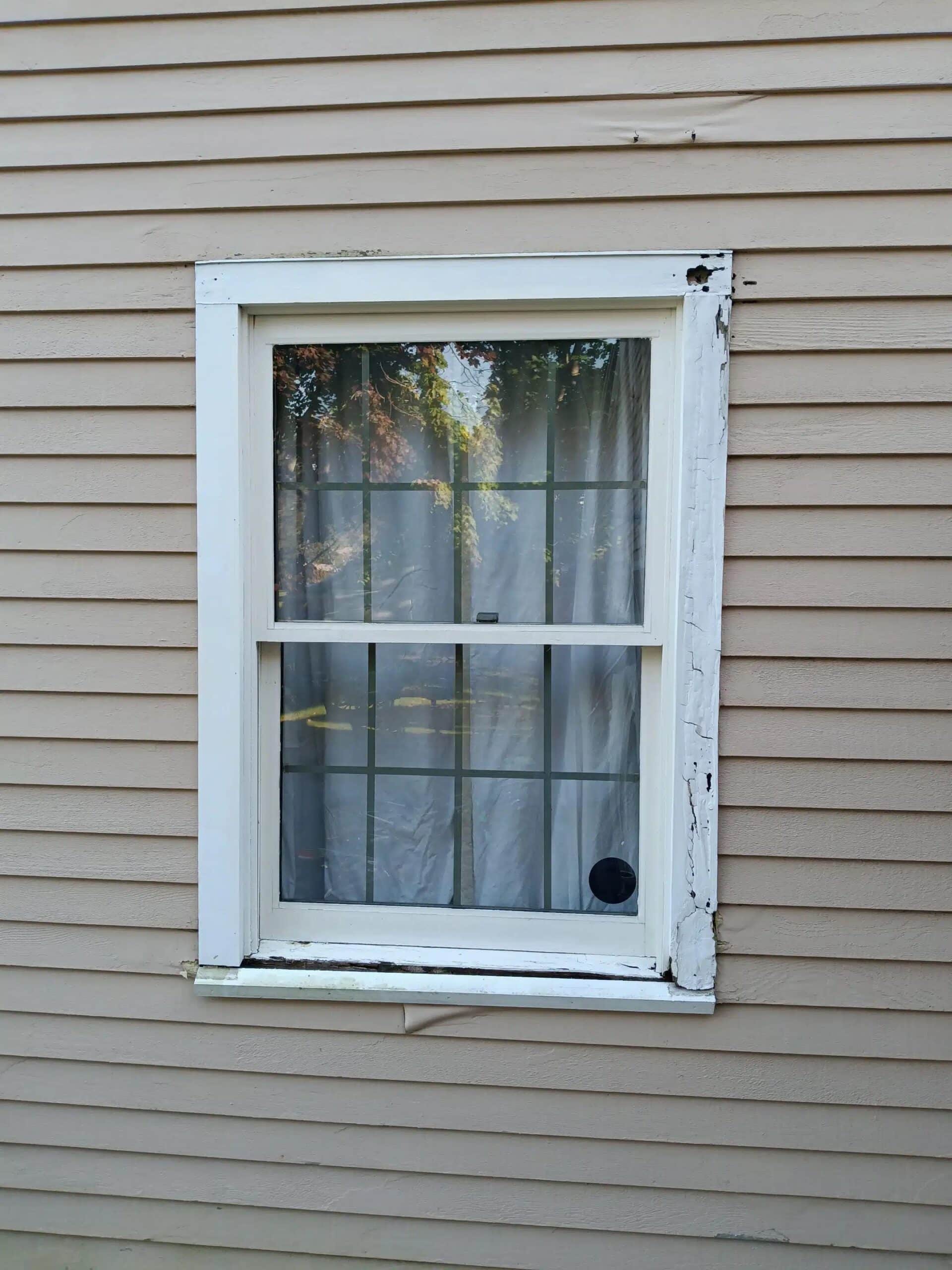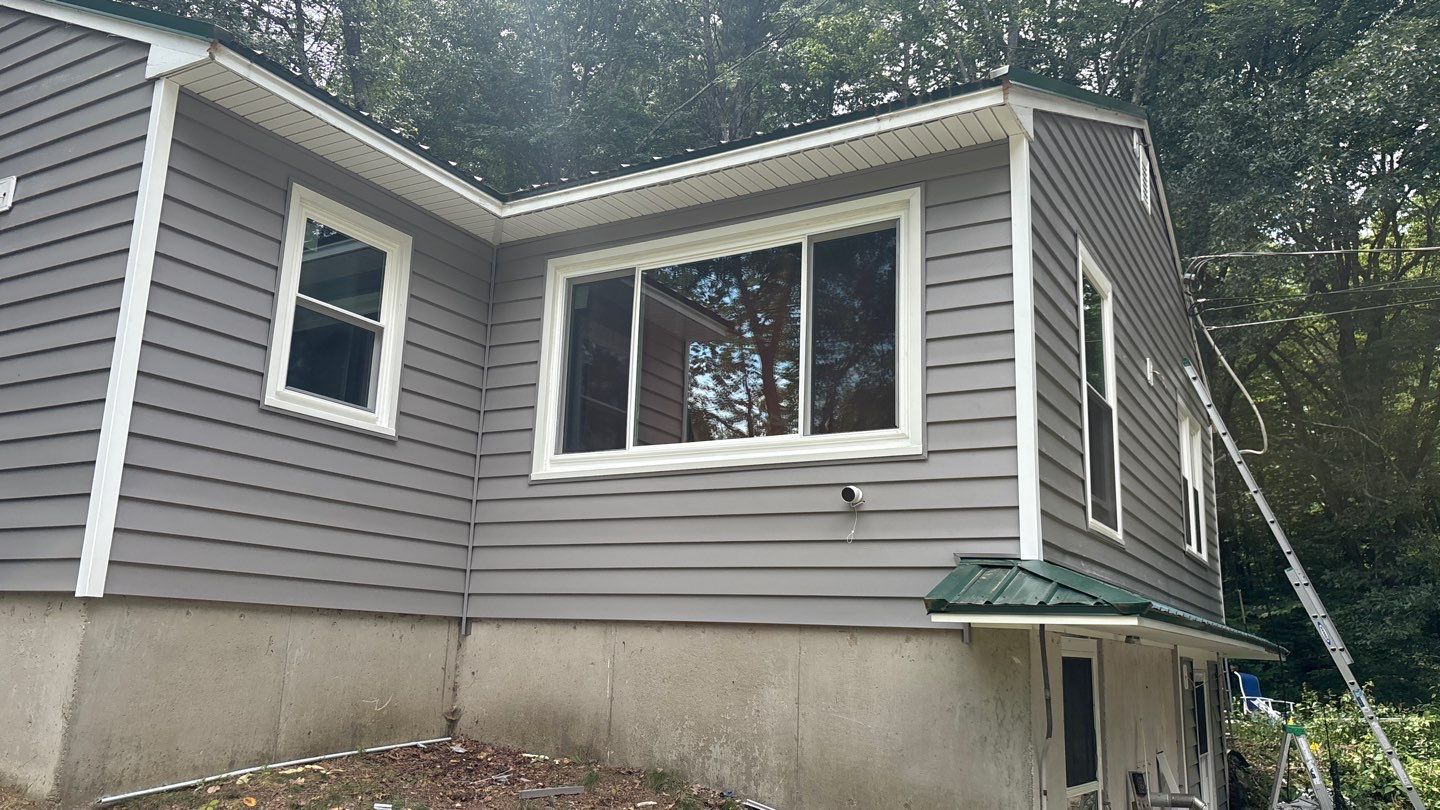Table of Contents

Old wood windows might look like they’re out of a storybook–but when they leak water, you’re looking at costly water damage on the horizon. One of the first steps to take is inspecting old windows for moisture damage, especially if your New England home has wood window frames. Unfortunately, old vinyl windows aren’t immune to water leaks, either. No matter the material, if the window becomes damaged, you might find yourself saying, “My windows are leaking water!”
Why Do Windows Leak Water?
If your windows are leaking water, you might wonder why this problem is happening in the first place. Windows leak water for several reasons and they depend on where the leak is coming from.
The Water is Coming from Around the Window
Depending on where the leak is located, the water can seep in from the top, sides, or bottom of the window. When you find water coming from around your window, consider the following:
- Leak Location and Cause: Water can seep in from the top, sides, or bottom of the window when the sealant or caulk becomes old and cracked.
- Signs of Degraded Sealant: Look for condensation around the edge of the window when it rains, or discoloration and abrasions on the caulk itself.
- Simple Fix: Replacing the old caulking with new caulk is a quick resolution.
- Important Consideration: If your windows are old and underperforming, caulk is considered a “band-aid resolution” and will likely fail again over time.
The Water is Leaking from the Top
Top-of-the-window leaks can indicate installation mistakes. It could be that the flashing was improperly installed, or it may not exist at all. A poorly installed house wrap could also lead to leaking windows.
1) Root Causes: Installation Mistakes
- Leaks coming from the top of the window often point to improper installation during construction.
- Missing or incorrectly installed flashing is a common culprit—it’s meant to direct water away from the window opening.
- House wrap that is poorly applied or not sealed properly can allow moisture to seep in.
- Windows that are not correctly fitted to the opening may create small gaps where water can enter over time.
- Using non–corrosion-resistant nails can lead to deterioration and eventual leakage at weak points.
- These issues might not show up immediately but can cause top-of-window leaks long after installation is complete.
2) The Solution: Repair vs. Replacement
- Simply applying caulk or sealant to the top of the window will not solve this kind of leak.
- Effective fixes often require removing flashing tape and house wrap to inspect the underlying structure.
- Because house wrap serves as a moisture barrier, any compromise here means water can enter behind the siding.
- In most cases, repairing the leak is not enough if the root issue is poor installation.
- Replacement of the window—with proper flashing, sealing, and slope—is usually the most reliable and long-term solution.
- Choosing replacement over patch repairs ensures the moisture barrier is fully restored and future leaks are prevented.
The Window Leaks from the Bottom
When customers call us asking for help with leaky windows, the leak could also be coming from the bottom of the window.
Drain Hole (Weep Hole) Issues
- Windows with metal or vinyl frames typically have small drain holes—also known as weep holes—near the bottom edges. These are designed to let accumulated water escape to the outside.
- Over time, these holes can become clogged with dirt, debris, or insect nests, preventing proper drainage. Use a straightened wire coat hanger or similar tool to gently clear out any blockages and restore water flow.

Window Sill and Slope Problems
- Water leaks often occur between the sill pan and the window sill, especially near the bottom where the sill is supposed to slope downward and away from the house.
- Every window should have a properly sloped sill to direct water away from the structure. If the slope is missing, incorrect, or poorly constructed, or if the sill pan is not properly sealed, water may infiltrate—potentially requiring the window to be reinstalled.
Using a Hose to Pinpoint Window Leaks
- A quick way to identify the exact source of a window leak is by performing a simple water test.
- Perform a simple water test to locate window leaks.
- Ask a helper to assist you during the test.
- Use a garden hose to gently spray water along the window edges.
- Start spraying from the bottom and slowly move upward.
- Stay inside and watch for signs of moisture—like drips, water spots, or damp areas.
- Pinpoint the exact spot where water enters to determine what needs repair.
Where to Spot Water Damage on Windows
Your windows have a big job—they reduce your energy bills while keeping your home dry. But harsh weather conditions such as snow, ice, and rain can wear down your windows over time, both in terms of aesthetics and performance.
If you’re looking for water damage on your home’s windows, it will be more prevalent on wood windows. It is very easy for wood window frames to succumb to moisture damage, as well as mold, and mildew growth, especially if they are not properly maintained. Signs of damage can include peeling paint and rot in wood windows and frames.
How to Detect Moisture Damage in Windows

If you suspect that your windows are leaking water, you might be unsure about what to look for in terms of moisture damage. Moisture damage can be obvious, but other times the signs are inconspicuous and go unnoticed.
These are the most common signs of moisture damage in windows:
- Check for discoloration around the windows and on the frames. You might find water spots and stains in the home that are brown, yellow, or copper in color.
- Cracks, bubbles, and peeling paint are all symptoms of potential window leaks.
- Changes in the texture of wood may also indicate window leaks. As an example, wood window frames may buck when they become detached from the siding. As well as sagging window frames, wood window frames may feel spongy from moisture damage.
- Mold and mildew can grow both inside and outside of walls under the right conditions.
- With severe moisture damage, you can poke a wood window frame with a screwdriver and it will sink right through the frame.
- The window has foggy glass that won’t wipe away.
- You feel a draft around your windows.
- You’re experiencing high energy bills.
Water damage is unlikely to occur with vinyl replacement windows. These windows also have weep holes that prevent water damage. Window weep holes drain water from your windows while preventing airflow into your home, and small flaps cover the holes to keep the wind from blowing through them. Additionally, the exterior holes are not aligned with the interior holes, which prevent direct airflow.
What Other Home Issues Can Be Mistaken for a Leaking Window?
Before you blame your windows, it’s worth considering a few usual suspects around the house that love to masquerade as window leaks. Sometimes, what looks like a rogue draft or puddle is actually the handiwork of other home issues.
Some common culprits include:
- Missing or damaged shingles: If your roof has seen better days, water can sneak in through gaps and show up near your windows, making it seem like they’re the enemy.
- Cracks in walls or siding: Small cracks—especially around window frames or in exterior siding—can channel water inward.
- Clogged gutters and downspouts: When gutters overflow (thank you, autumn leaves), water can back up and seep along walls, often ending up near window sills.
- Faulty flashing: Improper or aging flashing around roofs or chimneys can redirect water to interior walls or windows.
It’s always wise to rule out these possibilities before diving headfirst into window repairs. Sometimes, a simple fix elsewhere can save you the hassle and expense of replacing a window that isn’t the real culprit.
Can Damaged Window Hardware Cause Leaks?
Yes, damaged window hardware—like a faulty latch or handle—can absolutely contribute to leaks. When a window doesn’t close and seal tightly, rainwater can sneak through even the smallest gaps, finding its way inside your home.
The good news? Most hardware components are pretty affordable and simple to replace. By swapping out worn hinges, locks, or cranks, you can restore your window’s tight seal and keep unwanted moisture where it belongs: outside.

How to Prevent Your Windows from Leaking Water
Leaks around windows are a common problem in homes, but it doesn’t have to be that way. Taking the right steps to prevent your windows from leaking water can save you time and money in the future. The most common causes of windows leaking water are worn weatherstripping, cracks in the window frame, or a combination of both. Here are some tips to help you keep your windows from leaking water:
- Check the weatherstripping around your windows regularly. If you notice any wear or tear, replace it immediately. This will help seal off any gaps around your window, preventing water from entering. It’s also a good idea to check the caulking around your windows for any cracks or gaps. If you find any, add additional caulking to close the gaps and prevent water from entering.
- Inspect your window frames for any cracks or damage. If you find any, seal them off with a waterproof sealant. This will help keep water out and prevent further damage to your window frames. If the damage is severe, you may need to replace the window frame altogether.
- If your windows are not sealed properly, air can leak through and cause condensation. To prevent this, make sure all windows are properly sealed and insulated. This will help reduce the amount of moisture in your home and keep your windows from leaking water.
- Finally, make sure your windows are properly maintained. Clean the glass regularly to prevent dirt and debris from blocking the drainage holes. Also, inspect the window frames periodically for any signs of damage or wear and tear. Taking these steps will help keep your windows from leaking water.
Keep in mind that new vinyl windows can help improve home performance while preventing leaks. By following these tips, you can help keep your windows from leaking water and protect your home from costly repairs in the future.
What to do if Your Windows are Leaking Water
If you suspect your home’s windows are leaking water, you’ll need to call in a window company to assess the situation. Leaky windows often call for a replacement, and you’ll want to choose moisture-proof vinyl replacement windows that are not prone to mold growth and other types of moisture damage.
While there are temporary fixes, the most comprehensive and reliable way to address a leaking window is to replace it completely. When installed by an experienced professional, quality windows not only protect your home from moisture and water intrusion but can also help lower your heating and cooling bills. Investing in proper installation and high-performance materials means you’re safeguarding your home’s comfort, efficiency, and structure for years to come.
Contact us today for a quote on a high-performance replacement and window contractor who provides professional installation!

